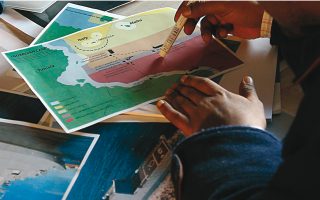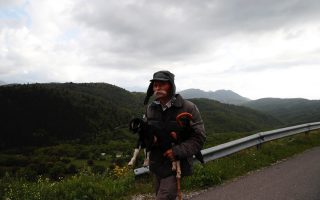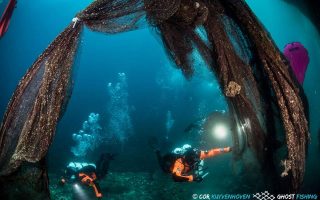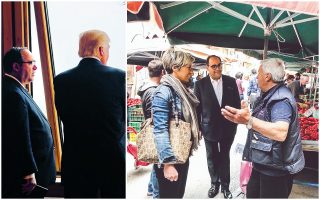A safe haven for abused children

On July 14, 2017, a court in Thessaloniki, northern Greece, convicted a woman and her boyfriend to a respective 40 and 47 years in prison for the rape and torture of the former’s two children.
The boys, today aged 13 and 15, had spoken in detail to social workers and psychologists of the abuse they suffered from 2011 to 2014 at the hands of their guardians: burns with cigarettes and hot oil, being locked in the basement, systematic rape… The court threw the book at the defendants, acknowledging no extenuating circumstances.
For Aristotelis Sidiropoulos, who was sitting in the public gallery that day, the verdict offered some consolation; it was a small victory. The retired architect and president of the Veria-based organization “Initiative for the Child,” which helps young victims of abuse, had kept a close eye on this particular trial.
“We see every case through to the end. We are there from the day that a case goes to court and usually testify as witnesses for the prosecution,” he tells Kathimerini.
The brothers had been placed in the organization’s care in 2014. Their case was one of the toughest its interdisciplinary team of experts has ever dealt with. “The abuse had started at a young age and was repetitive,” says Sidiropoulos.
“Abuse that is repetitive and comes from a person inside the family circle features two factors that can make the effects of that abuse irreversible.”
This was the case for one of the two siblings, who eventually had to be transferred to a psychiatric facility as the abuse he sustained took a devastating toll on his mental and emotional health.
“Unfortunately there are no specialized facilities for children who have been subjected to this level of torture, so they end up in psychiatric asylums. Why are they being punished?” laments Sidiropoulos.
The other boy lives in a long-term accommodation facility run by Initiative for the Child in the town of Vergina, northern Greece, and is doing well.
He may not know it, but the fact that he is able to get the care he receives is thanks to Alex Meschisvili, an 11-year-old boy who was killed by bullies in 2006 in an incident that sent shock waves through Greece and galvanized the local community of his native Veria. The boy’s body was never found.
“We formed an informal group to help Alex’s mother through the terrible ordeal, but also to help with the authorities’ investigations,” explains Sidiropoulos.
“The conclusion we came to, and which was later supported by child psychologists, was that his was a case of extreme bullying – and this was a time when we did not really understand what that meant – by a group of boys marginalized as a result of neglect. It was a cycle of violence and that prompted us to look for ways to prevent the evolution and reproduction of violence.”
That unofficial group evolved into Initiative for the Child, which was officially founded in 2008. “We didn’t want Alex’s death to be in vain, nor did we want to be the kind of group that acts only when something terrible happens,” he adds.
The organization’s first major step was opening a day shelter in 2010. “The idea was that we had to act in prevention. There were no centers for abused children at the time that provided a comprehensive response both for the child and for the family,” says Sidiropoulos.
Known as “Veria House,” the center started providing shelter to abandoned children or youngsters who were in between facilities within the formal system.
The need for Veria House to turn into a permanent care facility became increasingly apparent over time. “We started receiving cases that required a different level of intervention,” says Sidiropoulos.
Apart from Veria House, Initiative for the Child has since also created a trauma treatment center, a center for handling reports of abuse and providing counseling (tel 23310.23.700), and a semi-autonomous accommodation center for young people.
“We noticed that young people leaving closed accommodation facilities were then destroyed by their inability to find work. We needed a facility for these children, so we created one. Our objective is always the same: to prevent children from dysfunctional backgrounds from becoming socially marginalized. For this happen, they need to become assimilated in the center and to acquire mental resilience.”
Each child saved is a miracle, as the obstacles are unpredictable and too numerous to count.
“Another terrible case we handled was that of a man who sexually abused his partner’s children and broadcast it live on the internet. He was convicted to 50 years in prison, but was later paroled. I spoke out against the decision at the first Conference on Child Sexual Abuse in Veria in November 2017, and the result was that the case was taken up by the Supreme Court prosecutor. This is what child protection is all about. There is no such thing as a ‘little protection.’ You provide it or you don’t. And if you get threatening phone calls from prison, so be it. That’s how it goes.”





